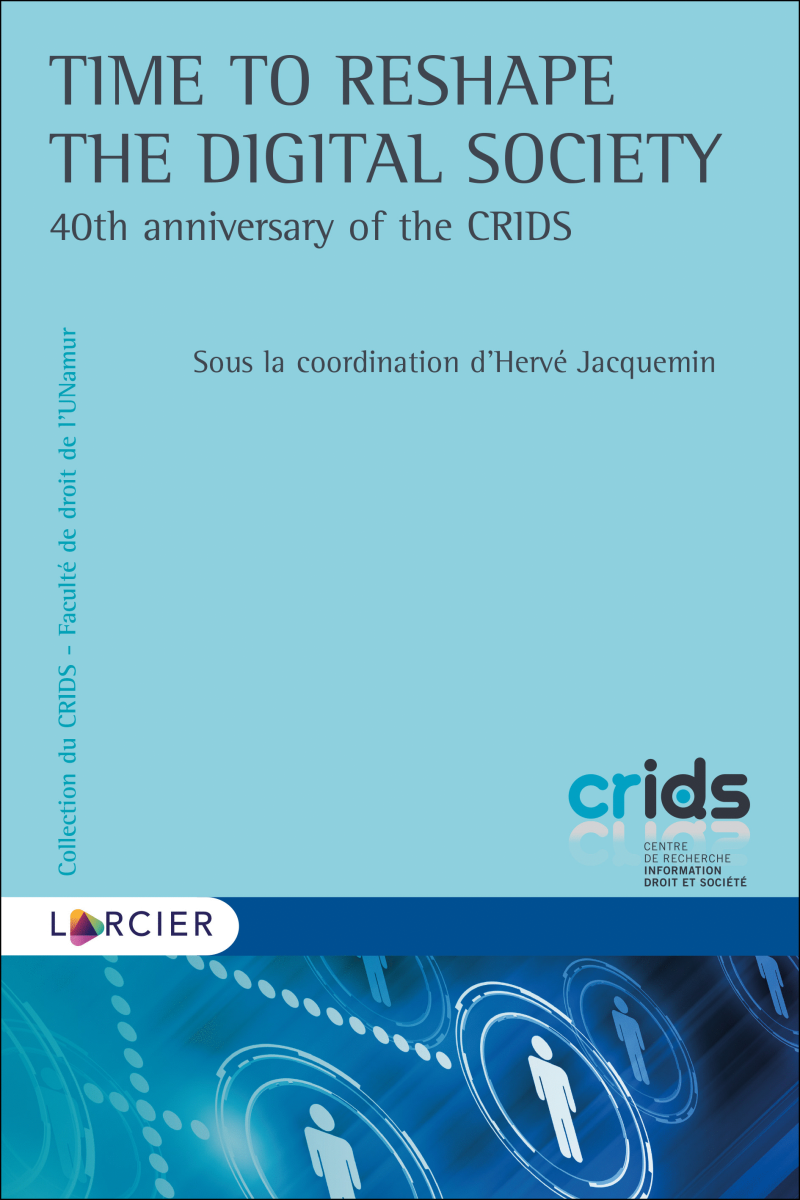 maestro
mastercard
visa
maestro
mastercard
visa

Time to Reshape the Digital Society
40th anniversary of the CRIDS

Pour célébrer les 40 ans du Centre de recherche Information Droit et Société (CRIDS/NADI) de l’Université de Namur, une conférence internationale a été organisée à Namur, les 18 et 19 novembre 2021, sur le thème « Time to Reshape the Digital Society ». Cet événement a rassemblé des académiques, des chercheurs et des praticiens (fonctionnaires, avocats, magistrats…), venus du monde entier et issus de différentes disciplines (droit, sociologie, philosophie, informatique, sciences de la communication, etc.). Ensemble, ils ont discuté de l’impact du numérique sur notre société et, en capitalisant sur l’expérience acquise au cours des derniers années, sur la manière de construire une société de l’information plus juste et centrée sur l’humain.
En complément à leur intervention lors de la conférence, plusieurs orateurs ont accepté de rédiger une contribution écrite, en français ou en anglais. L’ouvrage rassemble ces contributions. Elles sont regroupées en cinq thèmes : « Governance and Regulation » ; « Enforcement and Compliance » ; « Data » ; « Contracts and Liability » et « Artificial Intelligence ».
•••
To celebrate the 40th anniversary of the Research Center in Information Law and Society (CRIDS/NADI) of the University of Namur, an international conference took place in Namur on 18 and 19 November 2021, on the following theme: “Time to Reshape the Digital Society”. This event brought together academics, researchers and practitioners (public authorities, attorneys, judges, etc.) from all over the world and from different disciplines (law, sociology, philosophy, computer sciences, communication and information studies, etc.). They discussed the impact of digital technology on our society and, capitalizing on the experience gained in recent years, they shared views on how to build a more just and human-centered information society.
In addition to their interventions at the conference, several speakers agreed to write a contribution, in French or in English. This book gathers their contributions, structured around five topics: “Governance and Regulation”; “Enforcement and Compliance”; “Data”; “Contracts and Liability” and “Artificial Intelligence”.
Version numérique disponible sur :
- Strada lex Belgique
- Strada lex Luxembourg
- Strada lex Europe
Vous êtes abonné ? Activez gratuitement la version numérique grâce au code présent dans l’ouvrage.
| Type de produit | Livre |
|---|---|
| Format | Livre broché |
| EAN / ISSN | 9782807931350 |
| Nom de la collection | Collection du Crids |
| Poids | 862 g |
| Disponibilité | En stock |
| Nombre de pages | 555 p. |
| Avec exercice intégré | Non |
| Editeur | Larcier |
| Langue | Anglais, Français |
| Date de publication | 22 nov. 2021 |
| Disponible sur Strada Belgique | Oui |
| Disponible sur Strada Europe | Oui |
| Disponible sur Strada Luxembourg | Oui |
Avant-propos
Foreword
PART 1 – Governance and Regulation
CHAPITRE 1. – Le fonctionnement du marché intérieur de l’Union européenne devrait-il être repensé pour intégrer les impacts environnementaux des technologies numériques ?
CHAPTER 2. – How Blockchain Could Impact the Relationship Between Public Authorities and SMEs
CHAPITRE 3. – Pornhub selon une perspective cyberféministe : Vers une responsabilité coopérative et une gouvernance multiniveau
PART 2 – Enforcement and Compliance
CHAPTER 1. – The directive on whistleblowers to the test of the digital society : Between hope and desillusion
CHAPTER 2. – The Role of User-Generated Evidence in Criminal Investigations Versus the Removal of Terrorist Content Online: Towards a More Balanced Approach
CHAPTER 3. – Mandatory Information under GDPR : A Conceptual Model for Automated Privacy Policy Analysis
CHAPTER 4. – Personal data class actions three years after the application of the GDPR
CHAPITRE 5. – ARRCIS : Évaluation et renforcement de la conformité réglementaire d’un système d’information
CHAPTER 6. – Freedom versus Security : Methods of Controlling – Information Access by Intelligence and Law Enforcement Agencies
PART 3 – Data
CHAPTER 1. – High-altitude surveillance and data protection: Space, the final frontier of privacy?
CHAPTER 2. – The end of third-party cookies : nothing but smoke and mirrors if the RTB winner takes it all?
CHAPITRE 3. – Le consommateur de données
CHAPTER 4. – Privacy concerns related to the digital tax administration 2.0
CHAPTER 5. – All’s FAIR in Europe?
CHAPITRE 6. – Big Data dans l’IA et principe de minimisation : Défis et risques
CHAPITRE 7. – Données à caractère personnel et sécurité des systèmes d’information : quand faut-il siffler la fin de la récréation ?
CHAPTER 8. – Automated Decision-Making Under Amsterdam’s District Court Judgements
CHAPTER 9. – Big Boss is Watching You : Is Technology a Good or a Bad Thing for Human Employees?
PART 4 – Contract and Liability
CHAPTER 1. – Agile Project Management and Contract Law
CHAPITRE 2. – Quelques réflexions sur la rencontre des véhicules autonomes avec le droit des assurances
CHAPTER 3. – Intermediary liability and freedom of expression in the algorithmic age : swaying the balance?
PART 5 – Artificial Intelligence
CHAPITRE 1. – Les armes létales autonomes et le droit international humanitaire : le nécessaire contrôle humain sur l’usage de la force
CHAPTER 2. – From the Regulation of Artificial Intelligence by Society to the Regulation of Society by Artificial Intelligence: All Along the Watchtower
CHAPTER 3. – Breaking into the Black Box : How to Build Trust between Machine Learning-based Systems and their Users
CHAPTER 4. – AI as a Medical Device : Between the Medical Devices Framework and the General AI Regulation
CHAPTER 5. – Negotiating the Legal Status of Artificial Intelligence Systems in Future Societies
CHAPTER 6. – About some international documents relating to the ethics of Artificial Intelligence – Some insights